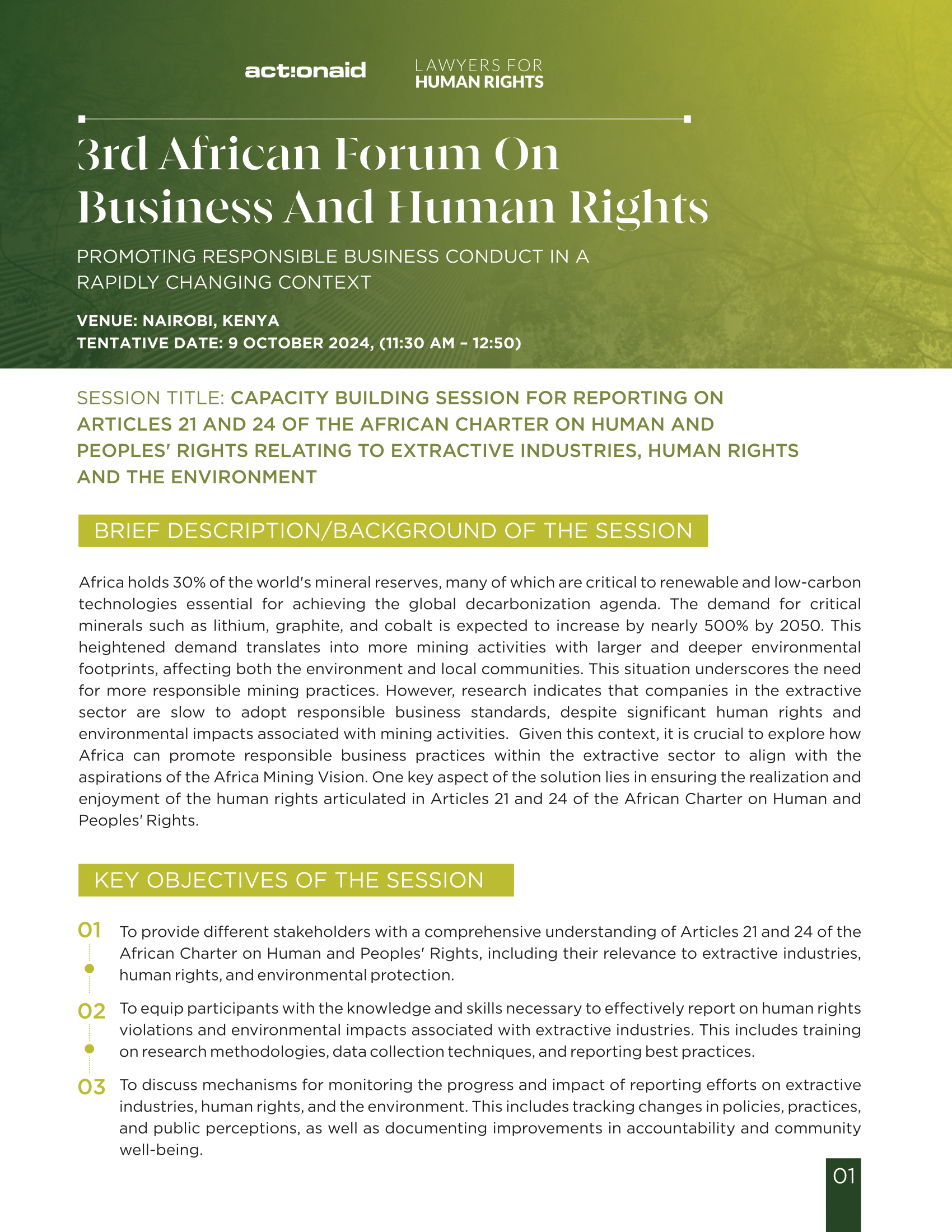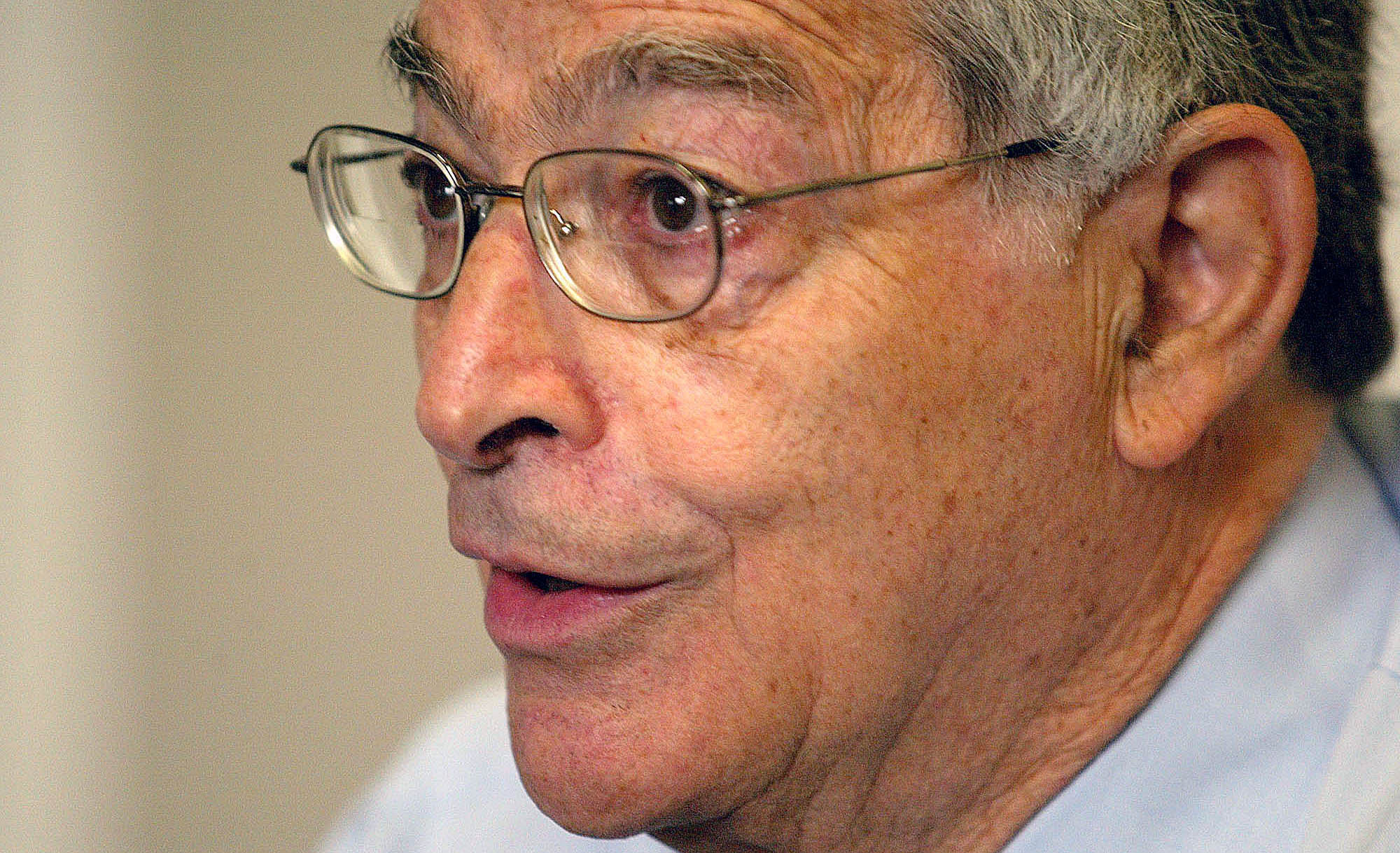On Wednesday, 9 October, at 10.20am ActionAid and Lawyers for Human Rights will host a side session at the 3rd African Forum on Business and Human Rights.
The session will deal with capacity building for reporting on Articles 21 and 24 of the African chart of human and people’s rights relating to extractive industries, human rights and their environment.
“Africa holds 30% of the world’s mineral reserves, many of which are critical to renewable and low-carbon technologies essential for achieving the global decarbonisation agenda. The demand for critical minerals such as lithium graphite and cobalt is expected to increase by nearly 500% by 2050. This heightened demand translates into more mining activities with larger and deeper environmental footprints, affecting both the environment and local communities. The situation underscores the need for responsible mining practices. However, research indicates that companies in the extractive sector are slow to adapt business standards despite significant human rights and environmental impacts associated with mining activities. Given this context it is crucial to explore how Africa can promote responsible business practices within the extractive sector to align with the aspirations of Africa Mining Vision. One key aspect of the solution lies in ensuring the realisation and enjoyment of the human rights articulated in Articles 21 and 24 of the African Charter on Human Rights and Peoples’ Rights.”
Join the discussion on Zoom.
Meeting ID: 833 9826 2746
Passcode: 818648

From Wednesday, 9 October until Friday, 11 October the Wits Institute for Social and Economic Research (WiSER), Innovation Foundation for Democracy and Alameda will host a symposium titled Rethinking Capitalism, Democracy and Crisis in South Africa.
“Thirty years since the end of apartheid the public mood in South Africa is pessimistic. While the national elections pushed the country into uncharted waters, crime and corruption continue to dominate headlines, while opinion makers wring their hands about opportunities lost and paths not taken. But bemoaning the current state of the country does little to explain the complexities of South Africa. It holds even less explanatory power for understanding how we got where we are today.
“While there has been much in the past 30 years that has been fraught, South Africa’s democracy has also been characterised by contradictory pulls and pressures, booms and busts across society. Does South Africa still symbolise a hopeful resolution to racial conflict, or is South Africa simply a byword for corruption? Does South Africa mean inequality or is it the poster child for ‘African development’? How should we understand the complexities and seeming contradictions that South Africa represents? This workshop brings together people from a range of different backgrounds – academics, activists, public intellectuals, and practitioners – to take stock of 30 years of South African democracy and consider how to move beyond the apocalyptic narratives of South Africa’s imminent collapse.”
Cameroonian historian and political theorist Achille Mbembe will deliver the keynote address on “Reflections on Thirty Years of Democracy”.
RSVP for in-person attendance to laura.phillips@wits.ac.za or join online here. (No online option for keynote address.)
Thursday, 10 October

Also, on Wednesday, 9 October, at 1 pm the Pro Vice-Chancellor for Climate, Sustainability and Inequality in partnership with the Wits Institute for Social and Economic Research (WiSER) will host a hybrid seminar titled “Is climate change governable?”
Paul N Edwards, Director of the Program on Science, Technology & Society at Stanford University, Co-Director of the Stanford Existential Risks Initiative, and Professor of Information and History (Emeritus) at the University of Michigan, will present a talk unpacking the potential for catastrophic, civilization-threatening climate change within the coming 2-3 centuries if climate sensitivity is on the high end of the Intergovernmental Panel on Climate Change estimates and the thresholds of multiple tipping points are crossed.
The talk will also unpack empirical evidence that Edwards argues supports a substantial likelihood of future climate policy reversals by major emitters, resulting in the continuing accumulation of greenhouse gases in the atmosphere.
“On high-end sensitivity estimates, Paris Agreement pledges to date are insufficient even if fully implemented. The policy is usually reversible, and major reversals have already occurred. Climate denialism and misinformation are already being amplified by artificial intelligence, social media, and certain governments, along with industrial lobby groups,” Edwards said.
In-person attendance: Wiser Seminar Room, 6th Floor, Richard Ward Building, Braamfontein, Campus East.
To attend the webinar online, register here.

On Thursday, 10 October, at 5 pm the Equal Education Law Centre will present the Third Annual Arthur Chaskalson Memorial Lecture, titled Beyond the Bench — Judicial Activism and Transformative Constitutionalism.
Arthur Chaskalson was the first president of South Africa’s new Constitutional Court and was the chief justice of South Africa from November 2001 until his retirement in 2005.
Nomfunda Ramalekana is a senior lecturer in Public Law at the University of Cape Town, where she teaches courses on Constitutional Law, and Dan Mafara, a senior researcher at the Council for the Advancement of the South African Constitution, will join facilitator Mudzuli Rakhivhane for the lecture.
“In South Africa – as in other constitutional democracies – the structure of the state, comprising legislative, executive and judicial branches, gives rise to occasional tensions, with one branch sometimes accusing another of breaching the “separation of powers”. For the past decade, or perhaps longer, the executive in South Africa has frequently accused the judiciary of excessive political involvement. It is said that judges transcend their mandate by making rulings based on their policy views, rather than objectively interpreting the law – a practice colloquially referred to as ‘legislating from the bench’. The media often makes things worse, diluting complex legal arguments into simplistic but catchy soundbites to maximise media coverage, resulting in a skewed public perception of the judiciary.” DM
Venue: Bowmans, 22 Bree Street, Cape Town

This article is more than a year old
South Africa
This week in civil society — Unpacking extractivism and human rights, and the Arthur Chaskalson Memorial Lecture.
On Thursday, 10 October 2024, Equal Education Law Centre will honour Arthur Chaskalson, the first president of South Africa’s new Constitutional Court and former chief justice in the Third Annual Arthur Chaskalson Memorial Lecture.




